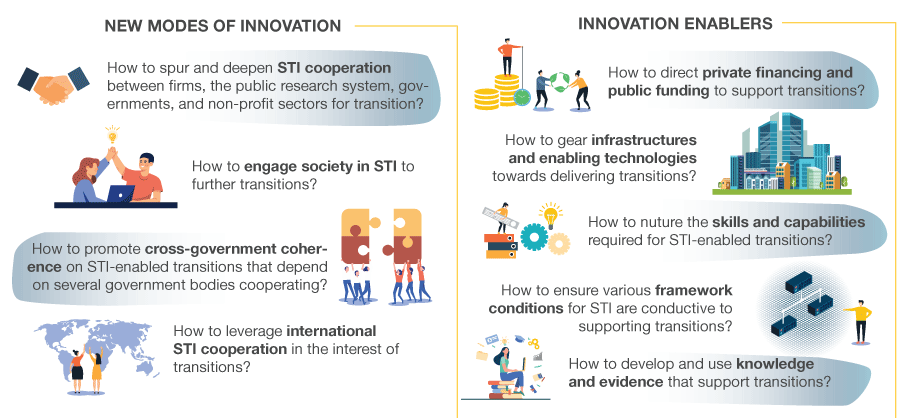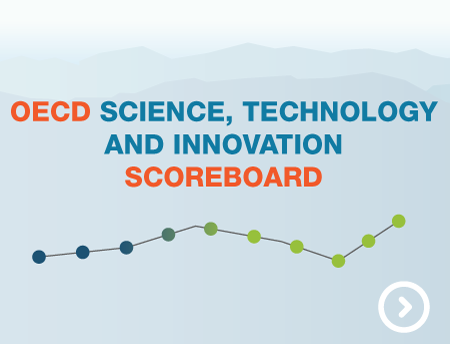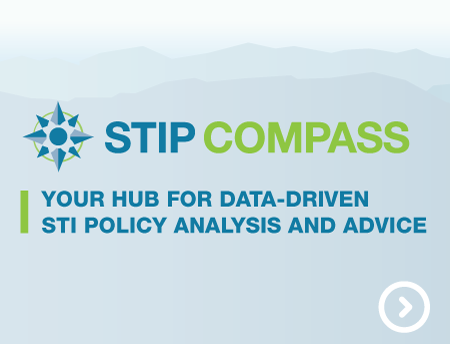S&T Policy 2025
A range of global crises, including climate change, resource depletion, biodiversity loss, the COVID-19 pandemic, and the ongoing war in Ukraine, present the world with major challenges. Contemporary configurations of large socio-technical systems in areas like energy, agrifood, mobility, and healthcare may not deliver the change needed in time to avoid various bleak scenarios.
Science, technology, and innovation (STI) policies should form a critical part of the comprehensive set of policy measures needed to trigger the transition of these socio-technical systems to meet global challenges. However, this calls for a re-think in government policymaking that takes a more systemic view of problems and an inclusive and holistic approach to STI policy interventions. While governments are already implementing relevant policies and governance arrangements, they need to be more ambitious and act with greater urgency in their STI policies.
The OECD’s projects (past, current and future) can be harnessed to provide guidance on systemic policy reforms that direct STI policy to meeting transition challenges. Joining up and consolidating insights from these projects into a broad vision and policy action plan will give them greater weight, while offering deep insights on specific issues of major policy concern. This is the aim of the crosscutting project, S&T Policy 2025 – Enabling Transitions through Science, Technology and Innovation. Read the leaflet.


Workshop on the research workforce of the future
22-23 November 2022 | Promoting diverse career options for doctoral and postdoctoral researchers
©OECD
Read more
60th TIP Workshop
7 December 2022 | 60th TIP workshop on rethinking innovation policy in times of transitions.
©OECD
Read moreThe project has several themes organised around two foci, one on the need for new modes of partnership for socio-technical transitions, and another on the development of enabling resources. Guidance on policy reforms will be packaged into modules around these themes, and will be accompanied by policy briefs on selected practices that show promise for transitions.

|
Catherine Beaudry | Chair holder - Canada Research Chair in Management and Economics of Inovation. Read more |
Alessandra Faggian | Director of Social Sciences & Deputy Rector presso GSSI - Gran Sasso Science Institute. Read more |
Michel Goldman | Founder of the Institute for Interdisciplinary Innovation in healthcare (I3h) at the Université libre de Bruxelles. Read more |
David H. Guston | Associate Vice Provost for Discovery, Engagement and Outcomes, Global Futures Laboratory at Arizona State University. Read more |
|
Marko Hekkert | Professor at Utrecht University; Chairman Copernicus Institute of Sustainable Development. Read more |
Alexis M. Kalergis | Full Professor and Director Millennium Institute on Immunology and Immunotherapy. Pontificia Universidad Católica de Chile. Member of the Chilean COVID Vaccine Advisory Council. Read more |
Mitsunobu Kano | Graduate School of Interdisciplinary Science and Engineering in Health Systems. Research areas: Nano-pathophysiology, Epidemiology, Science and Technology Policy. Read more |
Paula Kivimaa | Research Professor at Finnish Environment Institute SYKE and Associate at SPRU. Member of the Finnish Climate Change Panel. Read more |
|
Myong Hwa Lee | Research fellow and Head of the National R&D Research Office at the Science and Technology Policy Institute (STEPI) in South Korea. Read more |
Sylvia Schwaag-Seger | Professor of Research Policy at Lund University School of Economics and Management, LUSEM / Department of Business Administration, Sweden; Member of Swedish Prime Minister Innovation Council. Read more |
Anna Visvizi | Associate professor, Head of the International Political Economy Department, SGH Warsaw School of Economics, Warsaw, Poland. Read more |
Matthias Weber | Head of Center for Innovation Systems and Policy, AIT Austrian Institute of Technology GmbH. Read more |

May 2022
The Key Shaping Forces Impacting the Future Ocean Economy | 31 May 2022
The STI Ocean Economy Group, which led the landmark work on The Ocean Economy in 2030 and on Rethinking Innovation for a Sustainable Ocean Economy, is launching new foresight analysis of the ocean economy. In almost a decade since the start of the initial OECD ocean foresight work, the policy, regulatory and economy landscape have changed notably. The acceleration of climate change, diverse pollutions, biodiversity loss and the COVID-19 pandemic crisis are also creating new challenges for populations around the world in developed and developing countries. Geopolitical developments and races for resources will also have long-standing impacts.
April 2022
Strategic approaches for future transitions: How to improve effective collaborations in policymaking? | 25 April 2022
The challenges of achieving digital and environmentally sustainable transitions are complex, with governments required to deliver effective STI policies. These transitions cut across traditional policy and institutional boundaries, which place an emphasis on more integrated, coherent cross-governmental policies that can generate new transition trajectories. Moreover, the societal impacts of these transitions demand wider participation and would benefit from including civil society voices. This demands increased collaboration within policy communities and the wider ecosystem for perspectives and collective buy-in, as well as STI policies that are orientated towards the future to identify emerging issues and opportunities. This TIP workshop explored how collaborative efforts can be used to deliver effective policies for future transitions.
Public communication and engagement in science: lessons learned from COVID-19 | 22 April 2022
The COVID-19 crisis has dominated the public sphere for many months. The desire for rapid news on COVID-19-related developments, and the general interest of pretty much everyone in the world regarding COVID-19, meant that science was in greater demand than ever before. However, the crisis also underlined the challenges and potential weaknesses of science communication in society. Traditional media information was frequently challenged by postings on social networks.
March 2022
Scientific advice in crises: Lessons learned from COVID-19 | 3-4 March 2022
This workshop is one in a series of international expert workshops organised by the Global Science Forum in 2021-2022, as part of a project on mobilising science in response to crises.
The specific focus of this event is on scientific advice. It builds on previous OECD-GSF work on Scientific Advice for Policy Making: The Role and Responsibility of Expert Bodies and Individual Scientists and Scientific Advice During Crises: Facilitating Transnational Co-operation and Exchange of Information. These reports lay out a broad typology of different science advisory structures and processes, identify key issues and challenges for their effective operation and define a set of principles for developing rigorous and trusted scientific advice.
These were considered to be broadly applicable in the early phases of the COVID-19 pandemic (see our COVID-19 response policy note) but it is timely to revisit them in the light of the unprecedented ‘pressure test’ and intense scrutiny that scientific advice has been exposed to as the crisis has evolved. Science advice ecosystems are complex, operate at different scales and involve different actors, including scientists, policy-makers, risk analysts and crisis managers.
February 2022
Joint OECD-Vinnova workshop: What are countries’ STI policy goals and actions in the covid-19 recovery? | 7-8 February 2022
Countries across the OECD have developed ambitious plans for STI policy to contribute to socio-technical transitions as the world recovers from the impact of the COVID-19 pandemic. These plans contain a broad variety of policy goals and instruments designed to support STI in a changing global environment, to tackle new and growing challenges in the context of the COVID-19 pandemic, and to apply new tools and approaches to STI policy making, especially digital tools, that emerged in the context of the pandemic.
These plans take a variety of forms but are expected to have several common characteristics – namely a growing focus on sustainability, resilience, and inclusivity. The means by which countries approach these goals can be profoundly different, even when the goals are similar.
One such instrument is the RRF, a key component of the Next Generation EU (NGEU) programme, which is designed to make 672.5 billion euros (at 2018 prices) available to the countries of the European Union to respond to the economic and social consequences of the COVID-19 pandemic. The RRF is focused on encouraging structural changes and transitions: in particular, transitions that are “green” and “digital”.
December 2021
Innovating for innovation policy? Exploring the use of digital tools in STI policy making | 8 December 2021
New digital tools have the potential to improve STI policy by providing more granular, timely and accurate information on the workings and performance of STI ecosystems. This workshop, organised by the OECD Working Party on Innovation and Technology Policy and the STIP Data Lab, reviewed the application of various digital tools in STI policy making, such as machine learning, semantic analysis, and big data visualisation.
The workshop highlighted promising examples of promising applications of digital tools in STI policy, particularly the use of semantic analysis, and how these could complement existing approaches to gathering policy intelligence. It also considered the practical steps needed to promote the further development and use of digital tools in STI policy, including funding and capabilities gaps.
Technology in and for society | 6-7 December 2021
Good governance and ethics will be necessary to harness technology for the common good. This will require new forms of governance that operate “upstream” and throughout the process of scientific discovery and innovation. Upstream approaches aim to engage possible stakeholder concerns and values, address them through open and inclusive processes, and embed values of open societies – such as the protection of human rights, open and trusted markets, and diversity – in the development of new technologies.
This high-level conference marked an important milestone of Committee on Scientific and Technological Policy work on STI-led transitions and technology governance, as well as work of the OECD Working Party on Bio-, Nano- and Converging Technologies on responsible innovation. The conference explored values, design principles, and mechanisms that operate upstream and at different stages of the innovation value chain, and discussed stakeholder and broader public engagement as a means to align science and technology with societal values, goals and needs.
Enabling Transitions through Science, Technology and Innovation | 23 December 2021
OECD launches "S&T Policy 2025", an initiative to show the direction of science and technology policy in the new era - Aiming for the OECD Ministerial Declaration in 2023.
Behind the initiative presented in the webinar are issues such as the recent pandemic, climate change, the development of AI and the intensification of conflicts of hegemony related to science and technology. In response to these issues and the resolution of the UN's SDGs, the OECD's Committee for Science and Technology Policy (CSTP) decided that a thorough review of existing science and technology innovation (STI) policies was needed and launched the initiative.
November 2021
What role for Research & Technology Organisations in supporting sustainable transitions? | 19 November 2021
This event gathered policy makers and decision makers in research and technology organisations (RTOs) to discuss their contributions to solving societal challenges and supporting transitions toward more sustainable and resilient socio-economic systems. It was jointly organised by the OECD Working Party on Innovation and Technology Policy and the European Association of Research and Technology Organisations (EARTO).
The event saw an exchange of views and experiences between policy makers and RTOs on two main questions: What roles could RTOs play in sustainable transitions and what changes would that require in terms of strategy, organisation and internal processes? And what policy and governance conditions would help RTOs best play their role in sustainable transitions?
AI and the productivity of science | 29 October – 5 November 2021
This workshop, part of the OECD project on “AI and the Productivity of Science”, aimed to address the critically important issue of the rate of scientific progress, whether this is stagnating, as recently argued by a number of scholars, and how AI could raise the pace of progress in science and discovery.
The workshop brought together technical and policy experts to examine the evidence on a purported productivity decline in science as well as the ways that AI is currently used across different fields of science – from neuroscience to materials science – and across all stages in the scientific process. The workshop advanced the debate on what governments can do to maximise the positive impacts of AI on science, today and in the decades to come.
October 2021
Policy dialogue on S&T Policy 2025 - Enabling transitions through science, technology and innovation | 20 October 2021
This policy dialogue introduced the S&T 2025 Policy concept, which aims to provide an overarching vision and framework for STI policymakers to rethink, redesign and implement a new generation of STI policies that better contributes to sustainability transitions, resilience and inclusion. It also explored two substantive policy challenges – how to mobilise research and innovation system actors and how to manage STI interfaces with other policy areas – in pursuit of sustainability transitions.
Workshop participants supported the concept, while acknowledging several challenges that hinder the adoption of a transformative STI policy agenda. They considered the prospects for novel policy tools, such as mission-oriented innovation policies, to offer solutions. Participants also discussed how STI is currently “positioned” in government-wide discourses, strategies and initiatives on sustainability transitions, and the practical steps STI policymakers need to take to improve coordination with other policy areas.
Priority setting and coordination of research agendas: Lessons learned from COVID 19 | 4-5 October 2021
The COVID-19 pandemic has set off a cascade of responses from – and had impacts on – multiple actors across the STI ecosystem. Priority setting, steering and coordination of research efforts have been major challenges. The COVID-19 crisis has highlighted the limits of the previously established response mechanisms for pandemics and emphasised the need for better preparedness in the future. Governments will need to prepare more effectively for future shocks, assessing key risks and uncertainties and their implications for STI policy.
This workshop, organised by the OECD Global Science Forum (GSF), was part of the GSF project series on “Mobilising Science in times of crises”. It explored good practices and challenges in different national contexts and considered what policies can be implemented before, during and after a crisis to optimise the scientific response, using the COVID-19 pandemic as a reference.
September 2021
Improving academia-private sector interactions: Lessons learned from the COVID-19 pandemic | 16 September 2021
The COVID-19 pandemic has highlighted both the potential benefits of better interactions between academic researchers and industry and some of the challenges that need to be overcome to fully realise this potential. This workshop aimed to draw lessons from some of the actors directly involved in co-design and transdisciplinary research projects in the context of COVID-19, exploring how science policy and innovation policy can come together to support science-industry collaboration for societal benefit in the future. The workshop was jointly organised by the OECD Working Party on Innovation and Technology Policy and the OECD Global Science Forum.
The workshop emphasised the important role of policy to mobilise and incentivise cross-sectoral networks and partnerships. Managing the tension between science and research as a public good, funded by public money, while enabling industry to pursue commercial interests can be a major challenge. Citizen engagement also emerged as a key discussion point, both with regard to the inclusion of civil society in defining scientific priorities and in subsequent engagement in research projects.
June 2021
Creating momentum for joint knowledge creation during and after crisis | Wednesday 16 June 2021
Knowledge co-creation is an important means to mobilise a wide range of actors with complementary expertise to tackle issues that require the capabilities of multiple actors. Its importance was highlighted during the COVID-19 pandemic, since the joint creation of knowledge proved essential for developing solutions to the complex challenges that communities were facing. This workshop explored the future of knowledge co-creation both during and after the COVID-19 pandemic. It marked the culmination of the OECD Working Party on Innovation and Technology Policy’s project on co-creation (2019-20).
A highlight was the high-level policy roundtable for sharing insights on both the power of co-creation to respond to crises – illustrated by successful initiatives to combat COVID-19, like vaccine development – and the importance of integrating co-creation practices into STI more generally for a more resilient and inclusive future.
May 2021
R&D policies for better post-pandemic futures: New approaches and tools | 20-21 May 2021
The unequal impacts of the COVID-19 crisis on R&D investments across sectors and the accelerated adoption of digital tools and techniques for research and innovation purposes are, among others, likely to shape post-pandemic STI systems. This event, organised by the OECD Working Party on Innovation and Technology Policy (TIP), Ministry of Economic Affairs and Employment of Finland and VTT Technical Research Centre, brought together policy makers, business representatives and leading scholars to explore the STI policy implications of these impacts. The event marked the culmination of the TIP project on R&D intensity (2019-20).
The workshop explored the implications of accelerated adoption of digital tools and techniques for the industrial inclusiveness of STI systems; the challenges industry faces in conducting R&D activities, and the impacts that COVID-19 is having on them and the policy implications; and challenges in applying systems perspectives to the post-COVID-19 STI policy agenda.
Neurotechnology in and for society: Deliberation, stewardship and trust | 19-20 May 2021
Neurotechnology has great potential for improving societal health and well-being. Yet, just as with many other emerging technologies, it faces ethical, legal, and social challenges. In the absence of international instruments in this field, the OECD Council adopted a Recommendation on Responsible Innovation in Neurotechnology in December 2019. This workshop, organised by the OECD Working Party on Bio-, Nano- and Converging Technologies, focused on issues of societal deliberation, stewardship and trust that are vital to the notion of neurotechnology in and for society. The aim of the workshop was to build capacity to implement the Recommendation.
The workshop highlighted that standards and the OECD Recommendation could play a key coordinating function across a complex and challenging landscape of global governance. Promoting stewardship and trust across sectors requires joint responsibility, public communication, dialogue and data governance. Roadmaps, standards and indicators for the evaluation and assessment of the Recommendation could help drive its implementation by firms, governments and others.
Research Infrastructure mobilisation in response to COVID-19: Lessons learned | 11 May 2021
The COVID-19 pandemic has triggered an unprecedented mobilisation of the scientific community. Research infrastructures have played a major role in this global effort, mobilising their resources and opening up their facilities to new projects targeted to COVID-19. This workshop, organised by the OECD Global Science Forum (GSF) in partnership with Science Europe, was part of the GSF project series on “Mobilising Science in times of crises”. It was an opportunity to discuss some of the critical questions that emerged during the COVID-19 pandemic for different research infrastructure stakeholders, as well as to draw out lessons learned that could be useful in future emergencies or, more broadly, to improve the efficiency of research infrastructures in addressing scientific and societal challenges.
A number of key issues emerged from the discussion. For example, collaborative research infrastructures and networks established prior to crisis greatly facilitate cooperative work and data sharing during crisis. There is a need for a clear and transparent system of data stewardship, ensuring that data are safeguarded over time. More broadly, the whole research system needs to be pro-active to facilitate response in emergency: this includes networking, training a workforce that can be mobilised quickly, and establishing integrated structures that help cut down administrative and legal requirements during crises.
April 2021
Enhancing access to research data during crises: Lessons learned from the COVID-19 pandemic | 23 April 2021
Data access and re-use is critical for ensuring the efficiency and effectiveness of the global scientific research effort to address the COVID-19 pandemic. This workshop, organised by the OECD Global Science Forum (GSF) in partnership with the Research Data Alliance, was part of the GSF project series on “Mobilising Science in times of crises”. It aimed to explore lessons learned from FAIR and open data during COVID-19 and what this might mean for future policy.
The workshop highlighted the critical roles of research data infrastructures and networks in the science response to COVID-19. Funding is required to maintain these in a state of readiness. Making data FAIR should be part of routine research practice and the adoption of community-recognised standards is critical. There is a need to support incremental steps towards a global FAIR data system and keep moving forward with ‘a coalition of the willing’. Cooperative actions are required at different scales from local to global.
Imagining the future: The role of foresight and anticipatory governance in transitions | 6 April 2021
The climate emergency and COVID-19 crisis contribute to a sense of growing uncertainty about the future, leading to renewed interest in foresight and anticipatory governance practices. These practices aim to enhance societal capacities to imagine, understand, communicate on, and shape technology through the course of development so that technology might advance under conditions of trust and help realise social goals. This workshop, organised by the OECD Committee for Scientific and Technological Policy, set out to explore (i) the interface between foresight practices and ambitions to enact transitions, and (ii) recent experiments in the upstream governance of emerging technology.
On foresight practices, the workshop highlighted what works well, what needs improving, and how foresight might be used in the future to help better orient STI policies to support system transitions. On anticipatory governance, the workshop explored the potential of various emerging practices of public engagement and science communication to help produce a kind of innovation that is more productive, responsive to social needs, and socially robust.

















